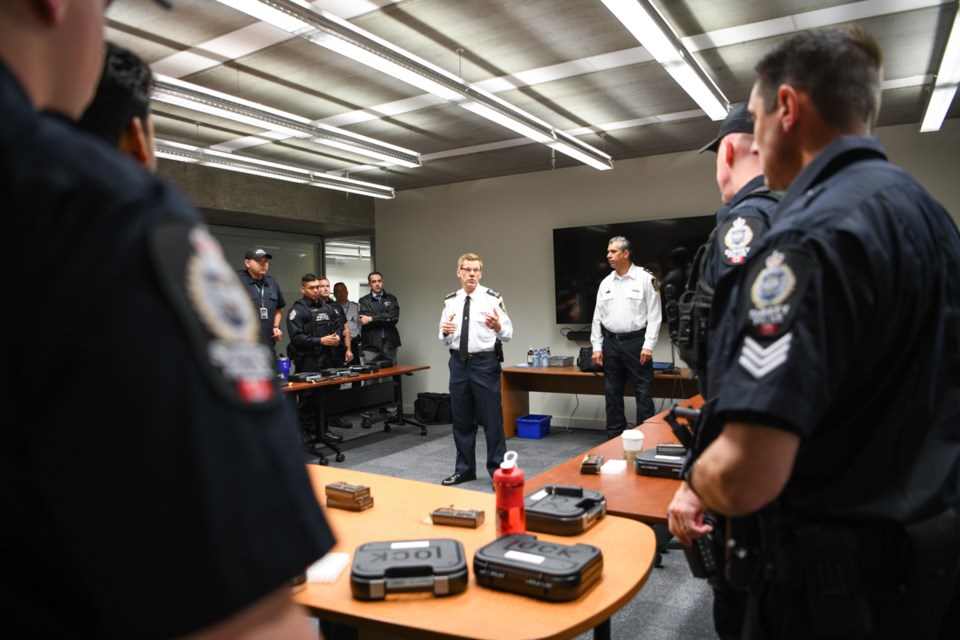Surrey Police Service Chief Norm Lipinski says he will continue moving forward with the city’s police transition plan until directed otherwise by the Surrey Police Board.
This, despite Surrey city council voting 5-4 Monday evening to create a plan to de-transition the Surrey Police Service (SPS) and maintain the Surrey RCMP as the municipality's official police unit.
“I’m not surprised by the vote,” said Lipinski, “but we have to look at the governance. I report to the police board and the police board reports to the province.
"The police board gives direction to the chief; not council."
Lipinski says city council also has no legal ability to direct the police board. According to a city statement issued Tuesday, “staff will be issuing a letter to the Surrey Police Board to pause all new hiring and expenditures pending further council direction.”
Mayor Brenda Locke, the board’s new chair, spearheaded the move after being narrowly elected on Oct. 15, defeating SPS architect Doug McCallum.
“Tonight’s vote not only affirms my promise to restore Surrey RCMP as police of jurisdiction, but it will finally reveal the costs of the transition, which will be made available to the public. Staff will now be working diligently on a report as requested by the Minister of Public Safety and Solicitor General for final approval,” said Locke.
It’s ‘showdown time’
Lipinski says until he hears from the board his plan is to keep hiring officers.
“We have to look at who has the lawful authority for giving instruction,” said Lipinski, who added he is hopeful a decision will come from the ministry within two months.
Lipinski cited the Police Act, which he says must be the guiding principle. The act shows that municipalities are responsible for adequately funding policing for their communities (and the province has powers to overturn them).
Criminologist Rob Gordon from Simon Fraser University says he suspects the Police Act is “well dusted off already” by all sides, but ultimately the bottom line falls to Minister of Public Safety and Solicitor General Mike Farnworth.
“I don’t think he wants to be responsible. But it is showdown time,” said Gordon.
“There’s a power struggle going on. That much is self-evident,” said Gordon.
And while the situation presents an “utterly fascinating” political quandary, it “doesn’t help the people of Surrey” and “it must be very confusing for the officers of the two police forces,” said Gordon.
Surrey residents paying for double duties
As it stands, there are 734 on-duty officers in Surrey. Since the transition began last year, at the approval of the Ministry of Public Safety and Solicitor General, 185 SPS officers have replaced as many Mounties and work under the Surrey RCMP’s command. Another 140 officers are on salary but in administrative duties (100) or in the recruitment and training process (40).
Lipinski says the administrative work revolves around policy development and assisting with recruitment.
Every two months Lipinski said he is adding about 30 to 35 SPS officers. There will come a point in time when SPS officers outnumber Mounties, who would then fall under the jurisdiction of the SPS, as the Surrey RCMP winds down.
It’s unclear when SPS would become the official unit, if everything stayed on course, but Lipinski said it could be done by summer of 2023, despite the city staff acknowledging “a significant amount of work to plan and deliver the transition must still be initiated, including determining how RCMP members will serve under SPS command and how files, equipment and IM/IT systems will be transferred.”
Locke is pledging a full airing of the costs accrued by SPS to date and what a de-transition would entail. She has asserted that keeping the Surrey RCMP will be more cost effective (partly due to a 10 per cent federal subsidy) and has downplayed Lipinski and the SPS union claiming severance costs could be north of $80 million.
Lipinski also says the SPS has sunken costs of just over $100 million, to date.
The transition was billed as a $45-million capital project and then revised to $63.7 million. The public had never been shown estimates of the costs of having two forces overlap.
“When you stand up a police service, you can’t get away from having two chiefs,” said Lipinski.
As far as costing the two forces simultaneously, “it’s fair to say it’s a grey area in that respect,” said Lipinski, adding “that is why its advantageous to do it as quickly as possible,” to lessen the administrative costs.
The City of Surrey says it’s already estimating cost overruns of over $20 million this year due to administrative overlap.
Police mandate was more clear in 2018: Lipinski
Financial costs and lack of transparency were a big factor for Locke changing her mind from when she initially voted to examine transitioning the Mounties, in November 2018.
Despite Locke being elected on a pledge to de-transition, Lipinski said nearly as many people voted for McCallum (27.31% to Locke’s 28.14%) and the other votes went to mayoral candidates with neutral positions. Coun. Linda Annis, who got the most votes for a council seat called for a referendum on the matter, and did so again Monday, albeit to no avail.
This is to say, said Lipinski, that Surrey residents did not have much of an appetite to de-transition this year, as compared to in 2018 when McCallum’s slate (including Locke) won all but one seat on a transition platform. And, said Lipinski, community outreach by SPS showed him that Surrey residents largely accepted the transition.
“It is not in the interest of the community to keep flip-flopping back and forth every four years. You’ll be in a state of constant confusion,” said Lipinski. “I’m confident and hopeful that the provincial government — and I can’t speak for them — but I truly believe the best model for a large municipality is a local municipal police service.”



